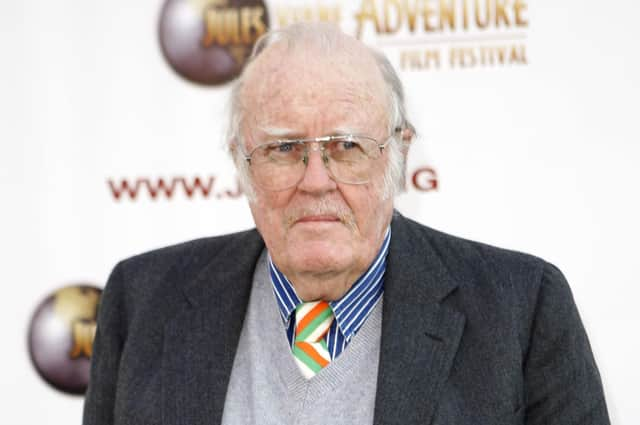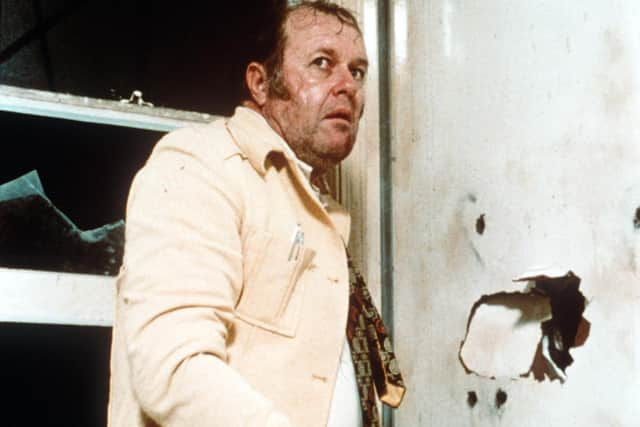Scotsman Obituaries: M Emmet Walsh, US actor whose presence elevated any film


With a smile that could send shivers down your spine, M Emmet Walsh was one of most memorable and distinctive supporting players in Hollywood movies.
You may not immediately recognise the name, but you would know the jowly features and the smile, used to slightly sinister effect in a string of movies, though Walsh could also appear avuncular, his girth suggesting an appetite for life.
Advertisement
Hide AdAdvertisement
Hide AdHe was never a big star, but there is a rule in movies called the Stanton-Walsh Rule which states that no movie in which M Emmet Walsh or Harry Dean Stanton appears will be ever completely bad.


In a career spanning more than half a century Walsh appeared in well over 200 films and television shows, largely in supporting roles.
In the classic 1982 sci-fi movie Blade Runner he played Captain Bryant, the shady police chief who lures Harrison Ford out of retirement through a haze of cigarette smoke, though Walsh himself did not smoke and repeated takes made him sick.
A few years later the then-unknown Coen Brothers wrote the role of the duplicitous private detective Loren Visser in Blood Simple specifically for him. More recently he was a security guard in the light-hearted mystery movie Knives Out with Daniel Craig.
It was the esteemed American movie critic Roger Ebert who coined the phrase “the Stanton-Walsh Rule”, suggesting that a characterisation by either actor was always sufficiently interesting in itself, if not to rescue a bad film, to at least give it some sort of worthwhile element.
Michael Emmet Walsh was born in 1935 in Ogdensburg, a town in upstate New York, and grew up largely in Swanton in Vermont, near the Canadian border, where his father and other relations worked as customs officers. An operation left Walsh left deaf in one ear from infancy.
He got involved in student drama productions while studying Business Administration at Clarkson University in New York State.
“I had a good faculty adviser up there who said ‘Why wait to be 40 to wonder whether you should have been an actor? Get rid of it now or find out’,” Walsh recalled in one interview.
Advertisement
Hide AdAdvertisement
Hide AdMoving to New York City, Walsh studied at the American Academy of Dramatic Arts, spent a decade working in regional theatre and in casual manual jobs and made his Broadway debut in 1969 in the play Does a Tiger Wear a Necktie?, which also helped launch the career of Al Pacino.
Walsh was also appearing in movies from much the same time, with small parts in Midnight Cowboy, Alice’s Restaurant, Little Big Man and Escape from the Planet of the Apes.
Larger roles as a cynical sports writer in the ice hockey comedy Slap Shot, a vicious parole officer in Straight Time and a straight-talking swim coach in Ordinary People helped establish his reputation as an actor whose very presence brought a certain element to a story.
Roger Ebert memorably called him “the poet of sleaze”, while another writer called him an “indelible gargoyle” with “poached-egg eyes”.
Such is the classic status now enjoyed by director Ridley Scott’s Blade Runner, based on a Philip K Dick story, that these days Walsh is probably as readily associated with the role of Harrison Ford’s boss in that movie as with any other role or film, though Walsh revealed that an early screening for cast and crew ended with complete silence.
“We didn’t know what to say or to think or do. We didn’t know what in the hell we had done. The only one who seemed to get it was Ridley,” he said in an interview a few years ago.
Blade Runner was unusually sophisticated and ambiguous for a market more attuned to the simple-mindedness of Star Wars and it was not a huge hit on its initial release.
Many viewers shared Walsh’s bafflement and critics of the period repeatedly struggled to accommodate films that mixed genres, with Blade Runner marrying science-fiction to film noir.
But the film benefits from repeated viewing.
Advertisement
Hide AdAdvertisement
Hide AdA poll of staff and readers at New Scientist magazine ranked it as the greatest sci-fi film of all time in 2008 and it was No 54 in a poll of critics on the best films across all genres in Sight and Sound magazine two years ago.
Walsh was shooting Silkwood in Oklahoma with Meryl Streep and Cher when his agent called to say he had a script for a low-budget film from “some kids” with no previous experience.
The film was the offbeat thriller Blood Simple and it was to shoot nearby in Texas, so Walsh took a chance and signed up for a minimal fee.
Blood Simple was the Coen Brothers’ debut feature. It was only a modest hit commercially, but it wowed critics and other film-makers and put Walsh very firmly in the sights of directors and producers
“Suddenly my price went up and everybody wanted me,” he said.
He went on to offer support to a long list of big Hollywood movies, including A Time to Kill, My Best Friend’s Wedding, Twilight and Knives Out.
“It’s a good life being a character actor,” he said. “I’ve been around Redford and Hoffman, and it’s scary.
"That drive for stardom is like the greyhound chasing the mechanical rabbit. By the time he catches him, he’s too tired to run any more, and you’ve got to shoot him.”
M Emmet Walsh was not married and did not have any children.
Obituaries
If you would like to submit an obituary (800-1000 words preferred, with jpeg image), contact [email protected]